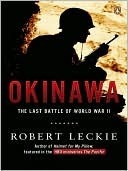More on this book
Kindle Notes & Highlights
Shinto, the naive nature-and-ancestor worship of ancient Japan, was also revived. Shinto, a Chinese word (significant of Chinese influence on Japanese culture), was based on a simple feeling of reverence for any surprising or awesome phenomenon of nature: a waterfall, a splendid cloud formation, a mountain, a magnificent tree, or even an oddly shaped stone. Places that stimulated such delight or awe became Shinto shrines. At the head of this basically shamanist religion stood a master medicine man: the divine emperor.
In truth, because of her gallant skipper and crew, Franklin was by far the most shattered carrier on either side to survive its ordeal.
In firepower, troops, and tonnage it eclipsed even the more-famous D day in Normandy on June 6, 1944.
He lost them because he violated a commander’s basic principle: never act on the premise of what you think the enemy will do but what he has the capacity to do.
It was not the fault of the troops—it never is—for as Napoléon said: “There are no bad regiments, only bad colonels.”
traditional military doctrine specifies that an attacking force, especially an invader from the sea, should possess at least a three-to-one superiority over the defense.
Triumphs of logistics, though impressive, usually do not make “rattling good reading,” as one British historian wrote of the Napoleonic Wars. Yet the industrial and logistics feat of the United States of America fighting the first great two-ocean war on record is unrivaled in the history of humankind;
Spruance was right: lives are definitely not “saved” by a carefully slow assault, they are merely spread out in time, but in the end the number of casualties is the same or almost so.
Truth trying to overtake falsehood is like the sound of an explosion seeking to catch up with the flash, and this seems to be especially true of that greatest myth of World War II: the belief that the atomic bombs dropped on Hiroshima and Nagasaki in early August 1945 compelled Japan to surrender.


